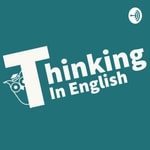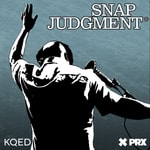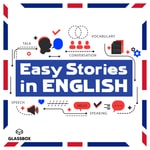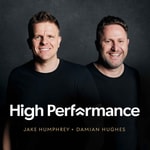Thinking in English – Détails, épisodes et analyse
Détails du podcast
Informations techniques et générales issues du flux RSS du podcast.

Thinking in English
Thomas Wilkinson
Fréquence : 1 épisode/4j. Total Éps: 429

Classements récents
Dernières positions dans les classements Apple Podcasts et Spotify.
Apple Podcasts
🇨🇦 Canada - languageLearning
29/07/2025#36🇬🇧 Grande Bretagne - languageLearning
29/07/2025#31🇩🇪 Allemagne - languageLearning
29/07/2025#36🇩🇪 Allemagne - education
29/07/2025#94🇺🇸 États-Unis - languageLearning
29/07/2025#56🇫🇷 France - languageLearning
29/07/2025#19🇫🇷 France - education
29/07/2025#69🇨🇦 Canada - languageLearning
28/07/2025#32🇬🇧 Grande Bretagne - languageLearning
28/07/2025#35🇩🇪 Allemagne - languageLearning
28/07/2025#39
Spotify
Aucun classement récent disponible
Liens partagés entre épisodes et podcasts
Liens présents dans les descriptions d'épisodes et autres podcasts les utilisant également.
See all- https://www.sessions.blue/
1003 partages
- https://thinkinginenglish.blog/
317 partages
- https://thinkinginenglish.link/
282 partages
- https://www.instagram.com/thinkinginenglishpodcast
1053 partages
- https://www.instagram.com/dansenseienglish
83 partages
- https://www.instagram.com/send7podcast
5 partages
Qualité et score du flux RSS
Évaluation technique de la qualité et de la structure du flux RSS.
See allScore global : 69%
Historique des publications
Répartition mensuelle des publications d'épisodes au fil des années.
311. How to Debate in English? (English Vocabulary Lesson)
Saison 1 · Épisode 311
lundi 26 août 2024 • Durée 20:38
Debating is an excellent way of practicing English. It forces you to present information and arguments in English, it challenges your listening comprehension, and it helps you to communicate confidently.
This episode explains the concept of a debate, talks about how debates are structures, and introduces some really useful vocabulary and phrases!
Transcript - https://thinkinginenglish.blog/2024/08/26/311-how-to-debate-in-english-english-vocabulary-lesson/
My Links
Patreon - https://www.patreon.com/thinkinginenglish TEST YOUR ENGLISH LEVEL - https://thinkinginenglish.link/placement-level-test/ Thinking in English Bonus Podcast - https://www.patreon.com/collection/10513 NEW YOUTUBE Channel!!! - https://www.youtube.com/@thinkinginenglishpodcast INSTAGRAM - thinkinginenglishpodcast (https://www.instagram.com/thinkinginenglishpodcast/) Blog - https://www.thinkinginenglish.blog
Vocabulary
- To rebut (verb): To refute or disprove an argument or claim.
- Persuade (verb): To cause someone to do something through reasoning or argument.
- Affirmative (adjective): Agreeing with or supporting a statement or request.
- Counterargument (noun): An argument or set of reasons put forward to oppose an idea or theory developed in another argument.
- Statement (noun): A clear expression of something in speech or writing.
- Structure (noun): The arrangement or organization of something.
- To present (verb): To show or display something, especially formally.
Borough by Blue Dot Sessions
--- Support this podcast: https://podcasters.spotify.com/pod/show/thinking-english/support310. History of Pizza! (English Vocabulary Lesson)
Saison 1 · Épisode 310
dimanche 18 août 2024 • Durée 23:35
Pizza is one of the most popular foods around the world, but home much do you know about its history?
Today, we’ll look at how pizza evolved from ancient flatbreads to a food for working people in Naples, to a globally popular dish!
Transcript - https://thinkinginenglish.blog/2024/08/19/310-history-of-pizza-english-vocabulary-lesson/
My Links
Patreon - https://www.patreon.com/thinkinginenglish TEST YOUR ENGLISH LEVEL - https://thinkinginenglish.link/placement-level-test/ Thinking in English Bonus Podcast - https://www.patreon.com/collection/10513 NEW YOUTUBE Channel!!! - https://www.youtube.com/@thinkinginenglishpodcast INSTAGRAM - thinkinginenglishpodcast (https://www.instagram.com/thinkinginenglishpodcast/)
Blog - https://www.thinkinginenglish.blog
Vocabulary
- Flatbread (noun): A type of bread made with flour, water, and salt, and then rolled into flattened dough.
- Topping (noun): Food items added on top of a dish.
- Peasant (noun): A poor person of low social status who owns or rents a small piece of land for cultivation.
- Ingredient (noun): Any of the foods or substances that are combined to make a particular dish.
- Speciality (noun): A dish that a restaurant or region is famous for.
- Endorse (verb): To declare one's public approval or support of something.
Borough by Blue Dot Sessions
--- Support this podcast: https://podcasters.spotify.com/pod/show/thinking-english/support301. UK General Election Explained! (English Vocabulary Lesson)
Saison 1 · Épisode 301
lundi 17 juin 2024 • Durée 23:56
On July 4th, 2024, the UK will hold a general election to elect a new government, parliament, and Prime Minister.
In this episode, I want to provide a detailed and thorough explanation and introduction to how elections work in the United Kingdom!
Transcript - https://thinkinginenglish.blog/2024/06/17/301-uk-general-election-explained-english-vocabulary-lesson/
My Links
Patreon - https://www.patreon.com/thinkinginenglish TEST YOUR ENGLISH LEVEL - https://thinkinginenglish.link/placement-level-test/ Thinking in English Bonus Podcast - https://www.patreon.com/collection/10513 NEW YOUTUBE Channel!!! - https://www.youtube.com/@thinkinginenglishpodcast INSTAGRAM - thinkinginenglishpodcast (https://www.instagram.com/thinkinginenglishpodcast/) Blog - https://www.thinkinginenglish.blog
VOCABULARY LIST
- Prime Minister (noun): The head of government in a parliamentary system who is responsible for running the government.
- Parliament (noun): The supreme legislative body in a country, made up of elected representatives who make and pass laws.
- Election (noun): A formal process by which voters choose individuals to hold public office.
- Government (noun): The governing body of a nation, responsible for making and enforcing laws and policies.
- Vote (verb): To cast a ballot in an election.
- Constituency (noun): A geographical area represented by an elected official in a legislative body.
- Campaign (verb): To work actively to promote a candidate, cause, or policy.
211. How to Use AI and ChatGPT to Study English?
Saison 1 · Épisode 211
lundi 27 février 2023 • Durée 21:17
Check Out the That Makes Sensei Podcast!! - https://linktr.ee/thatmakessenseipodcast
That Makes Sensei YouTube - https://www.youtube.com/@thatmakessenseipodcast
I’m sure many of you have heard about Ai and ChatGPT, but have you ever thought about using them to help you study, practice, and learn English? Listen to this episode for a complete introduction to ChatGPT, and its uses (and limitations) for English learners!
Buy Me a Coffee - https://www.buymeacoffee.com/dashboard
JOIN THE CONVERSATION CLUB -- https://www.patreon.com/thinkinginenglish
ENGLISH CLASSES - https://thinkinginenglish.link/
NEW YOUTUBE Channel!!! - https://www.youtube.com/@thinkinginenglishpodcast
INSTAGRAM - thinkinginenglishpodcast (https://www.instagram.com/thinkinginenglishpodcast/)
210. What is Greenwashing? (English Vocabulary Lesson)
Saison 1 · Épisode 210
mercredi 22 février 2023 • Durée 20:25
My Links
Buy Me a Coffee - https://www.buymeacoffee.com/dashboard
JOIN THE CONVERSATION CLUB -- https://www.patreon.com/thinkinginenglish
ENGLISH CLASSES - https://thinkinginenglish.link/
TRANSCRIPT - https://thinkinginenglish.blog/2023/02/22/210-what-is-greenwashing/
NEW YOUTUBE Channel!!! - https://www.youtube.com/@thinkinginenglishpodcast
INSTAGRAM - thinkinginenglishpodcast (https://www.instagram.com/thinkinginenglishpodcast/)
- Sustainable (adj) - causing, or made in a way that causes, little or no damage to the environment and therefore able to continue for a long time. The website encourages sustainable fashion through swapping.
- Environmentally friendly (adj) - not harmful to the environment, or trying to help the environment. We will use environmentally friendly energy sources.
- Marketing (n) - a job that involves encouraging people to buy a product or service. He would like a career in marketing.
- To mislead (v) – to cause someone to believe something that is not true. He has admitted misleading the police.
- -Conscious (suffix) – used after nouns and adverbs to mean “knowing about and worried about a particular thing” or “thinking that something is important” We appeal to health-conscious consumers.
- Biodegradable (adj) – able to decay naturally and in a way that is not harmful. Biodegradable packaging helps to limit the amount of harmful chemicals released into the environment.
- Certification (n) – the act of providing an official document as proof that something has happened or been done Fairtrade is a certification that guarantees producers in the developing world are paid a fair price for their crops.
- Consumer (n) – a person who buys goods or services for their own use The new rates will affect all consumers, including businesses
209. How to Stop Saying “Like,” “Um,” and “You Know”! (English Vocabulary Episode)
Saison 1 · Épisode 209
lundi 20 février 2023 • Durée 18:54
Check Out the That Makes Sensei Podcast!! - https://linktr.ee/thatmakessenseipodcast
That Makes Sensei YouTube - https://www.youtube.com/@thatmakessenseipodcast
Today I’m going to talk about English filler words! I’ll explain why we use filler words, why you should stop using them, and how to reduce the number of likes, ums, and you knows in your English speech.
My Links
ENGLISH CLASSES - https://thinkinginenglish.link/
JOIN THE CONVERSATION CLUB -- https://www.patreon.com/thinkinginenglish
NEW YOUTUBE Channel!!! - https://www.youtube.com/@thinkinginenglishpodcast
INSTAGRAM - thinkinginenglishpodcast (https://www.instagram.com/thinkinginenglishpodcast/)
208. English for Disasters and Emergencies: Essential Language to Talk About and Survive Natural Disasters (English Vocabulary Episode)
Saison 1 · Épisode 208
mercredi 15 février 2023 • Durée 20:12
Today’s episode will introduce and explain vocabulary that may be essential in a disaster. I will teach you key phrases and words to describe disasters, raise awareness and gain support, and that may help you survive in a disaster situation. This episode is dedicated to the people affected by the recent earthquake in Turkey and the Middle East, and should hopefully be a useful resource to people wanting to communicate about natural disasters in English.
TRANSCRIPT - https://thinkinginenglish.blog/2023/02/15/208-english-for-disasters-and-emergencies/
My Links
ENGLISH CLASSES - https://thinkinginenglish.link/
JOIN THE CONVERSATION CLUB -- https://www.patreon.com/thinkinginenglish
NEW YOUTUBE Channel!!! - https://www.youtube.com/@thinkinginenglishpodcast
INSTAGRAM - thinkinginenglishpodcast (https://www.instagram.com/thinkinginenglishpodcast/)
207. The History of Valentine’s Day! (English Vocabulary Lesson)
Saison 1 · Épisode 207
lundi 13 février 2023 • Durée 20:46
Today, let’s discuss the history of St Valentine’s Day. How did the holiday transform from a Roman festival to a Christian holiday to an international day of love? Let’s discuss this while learning new vocabulary!
ENGLISH CLASSES - https://thinkinginenglish.link/
JOIN THE CONVERSATION CLUB -- https://www.patreon.com/thinkinginenglish
NEW YOUTUBE Channel!!! - https://www.youtube.com/@thinkinginenglishpodcast
TRANSCRIPT - https://thinkinginenglish.blog/2023/02/13/207-the-history-of-valentines-day/
INSTAGRAM - thinkinginenglishpodcast (https://www.instagram.com/thinkinginenglishpodcast/)
- To exchange (v) - the act of giving something to someone and them giving you something elseI exchanged gifts with my girlfriend
- Saint (n) – (St) a person who has received an official honour from the Christian, especially the Roman Catholic, Church for having lived in a good and holy waySaint George is the patron saint of England
- To convert (v) - to change to a new religionHe converted to Catholicism when he got married
- Festival (n) - a special day or period, usually in memory of a religious event, with its own social activities, food, or ceremoniesHoli is a famous festival in India
- Fertility (n) - the quality of being able to produce young or fruitShe began fertility treatment at the clinic three years ago
- To commercialise (v) - to develop or organize something in order to make as much money as possibleChristmas is now a commercialised holiday
- Affection (n) - a feeling of liking for a person or placeHe had a deep affection for his aunt
206. What is the Best Method to Improve Your English PRONUNCIATION?
Saison 1 · Épisode 206
mercredi 8 février 2023 • Durée 27:46
Today I am going to give you all an introduction to the different methods commonly used to improve pronunciation. Listen to discover the best way to develop excellent pronunciation and correct the underlying issues you face!
ENGLISH CLASSES - https://thinkinginenglish.link/
JOIN THE CONVERSATION CLUB -- https://www.patreon.com/thinkinginenglish
NEW YOUTUBE Channel!!! - https://www.youtube.com/@thinkinginenglishpodcast
INSTAGRAM - thinkinginenglishpodcast (https://www.instagram.com/thinkinginenglishpodcast/)
--- Support this podcast: https://podcasters.spotify.com/pod/show/thinking-english/support205. Why Did Britain Invent So Many Sports? (English Vocabulary Lesson)
Saison 1 · Épisode 205
lundi 6 février 2023 • Durée 25:46
From tennis, ping pong, and badminton to boxing, rugby, and football, the rules of many modern sports were written by British people! Why? Today I want to explain how and why so many of the world’s sports were invented by the British!
ENGLISH CLASSES - https://thinkinginenglish.link/
JOIN THE CONVERSATION CLUB -- https://www.patreon.com/thinkinginenglish
NEW YOUTUBE Channel!!! - https://www.youtube.com/@thinkinginenglishpodcast
TRANSCRIPT - https://thinkinginenglish.blog/2023/02/06/205-why-did-britain-invent-so-many-sports/
INSTAGRAM - thinkinginenglishpodcast (https://www.instagram.com/thinkinginenglishpodcast/)
- To invent (v) - to design or create something that did not exist before. The World Wide Web was invented in 1989.
- Folk (adj) - traditional to or typical of a particular group or country, especially one where people mainly live in the countryside, and usually passed on from parents to their children over a long period of time. There are some unique folk dances in this city.
- To codify (v) - to organize and write a law or system of laws. The UK doesn’t have a codified constitution.
- Alumni (plural n) - men and women who have completed their studies, esp. at a school, college, or university. There will be reunion of university alumni next week.
- Elite (adj) - belonging to the richest, most powerful, best-educated, or best-trained group in a society. Elite universities are very competitive to enter.
- Boarding school (n) - a school where students live and study. He studied at a boarding school in the UK.
- Administrator (n) - someone whose job is to control the operation of a business, organization, or plan. She works as a school administrator.
- Set something up (phrasal v) - to formally establish a new company, organization, system, way of working, etc. She plans to set up her own business.









